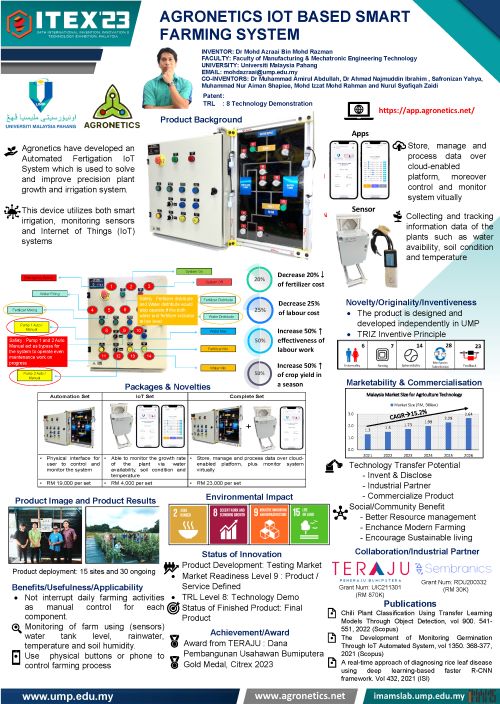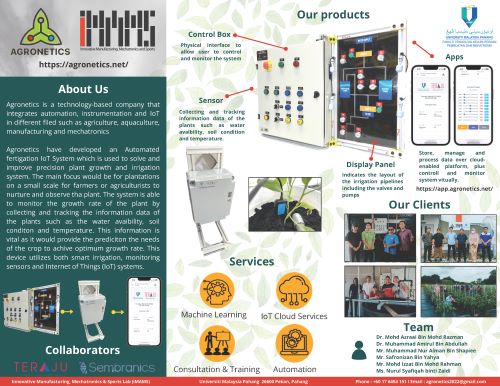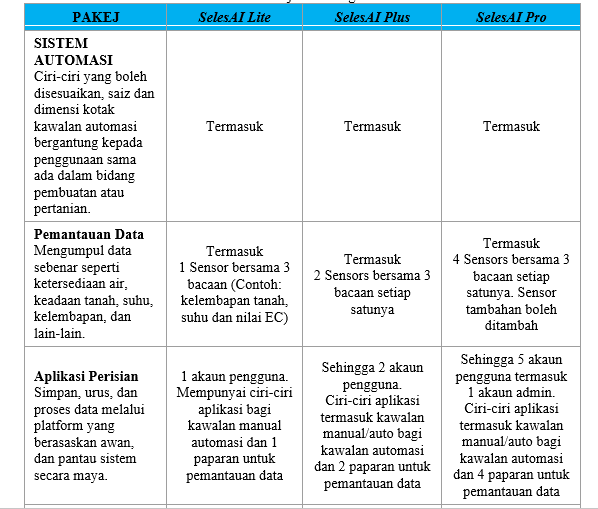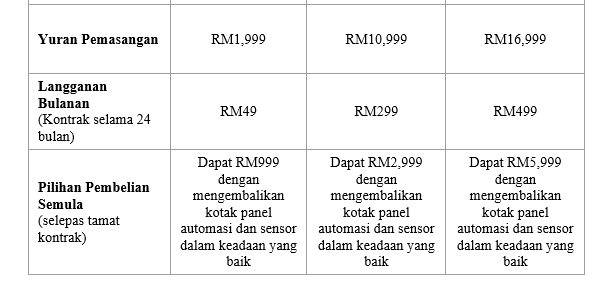Dr. Mohd Azraai helps farmers improve accuracy in watering and plant growth systems

Researcher and lecturer of the Faculty of Manufacturing and Mechatronics Engineering Technology (FTKPM), Universiti Malaysia Pahang Al-Sultan Abdullah (UMPSA) was determined to study the cause of his failure to produce quality crops and consistent results by creating Agronetics or Automated Internet of Things (IoT) Fertigation System which is used to improve accuracy in watering and crop growth systems.
This research was conducted at iMAMS Laboratory, FTKPM.
When COVID-19 hit the world and when the Movement Control Order (MCO) began in Malaysia in 2020, Dr. Mohd Azraai Mohd Razman, 36 continued this research at his home.
At that time, he realised that it was difficult to find out the real cause when his crops were less fruitful.
This research was also assisted by a senior lecturer of FTKPM, Dr. Muhammad Amirul Abdullah, and also received collaboration from the staff of the Industry and Community Network Division (BJIM), Yusmin Jaafar and Rozana Sahadan.

According to him, he is aware of one of the reasons why agriculture is not the preferred occupation of the current generation due to various negative perceptions and stigmas besides requiring challenging physical work, but the outcomes are not as expected.
“After the MCO, we began to research various information related to plants including the use of sensors.
“This agro-related research has also been made the main topic for the final year project.
“Although Agronetics has been completed in mid-2021, various improvements have been made to ensure that this product works properly and meets the needs of the agricultural industry,” he said.
Commenting on Agronetics, this product has three main features, namely a user-friendly automation control box for watering and fertiliser, sensors to detect the water level and fertiliser liquid in the tank, and sensors to detect the availability of water, soil conditions and temperature, and IoT technology in one device.

“It is a very interesting system because it is able to change the routine of repetitive garden work such as watering trees and irrigating fertiliser liquid to a one-shot-at-a-time method.
“There are three options that can be done either manually by pressing the button on the automation control box every time the watering time, setting the watering and fertiliser liquid irrigation time on a scheduled basis through the device or smartphone, or pressing the watering and fertiliser liquid irrigation button through the app on the device or smartphone.
“Agronetics also has sensors that can detect temperature, water availability, and the concentration of liquid fertiliser in the soil,” he said.
He further explained that this sensor could provide information to farmers whether the plant is photosynthesising or not, whether the plant roots absorb fertiliser liquid or not, and whether the plant is ‘thirsty’ or not.
“This is what is called farming with knowledge and the advantages of this method are very economical in the use of water and fertiliser.
“We can breathe a sigh of relief because this research has finally come to fruition.
“As mentioned earlier, negative perceptions and stigma regarding the hardships and difficulties of working in agriculture are very thick among the community," he added.
According to him, with the availability of Agronetics products in the agricultural industry, there are so many challenging physical work routines that can be reduced besides the daily time in the garden can be focused on pruning, managing crop pests and other work.
“This farming method with knowledge is able to produce grade A crops that bear quality fruits.
“If more farmers like this, it is possible that local vegetable products can be exported abroad,” he said.
“Researchers at FTKPM have begun to focus on agro-technology research,” he said.
In fact, he has completed the creation of the SelesAI Platform which serves as the main application hub for all Agronetics products.
“The SelesAI Platform is very useful for large companies who want to oversee the progress of their subsidiaries’ gardens or farms that already use Agronetics products.
“The platform uses virtual cloud technology, enabling data storage, management, and processing in a cloud-based environment.
“Users can monitor the operation of the system online and seamlessly integrate automated devices of various types to create a comprehensive agricultural solution,” he said.
To date, BJIM has contributed their expertise in agriculture while the FTKPM research group is working on automation and IoT technology.
They have also made many direct collaborations with the community, especially in sustaining agriculture.
This combined result will certainly increase crop yields if Agronetics products receive widespread coverage among farmers.
This product research received RM2 million in funding through an industrial grant from the Bumiputera Agenda Steering Unit (TERAJU) to open opportunities for small and medium enterprise entrepreneurs (B40 group) in producing agricultural products such as chilli and eggplant to the local market through the Bumiputera Entrepreneur Development Fund (DPUB) programme.
The function of researchers in this industry grant is to provide agricultural equipment in the form of an intelligent fertigation system that is more efficient and user-friendly than the traditional cultivation system and conventional fertigation system to 45 participants of this grant.
BJIM also participated in the success of the DPUB programme by equipping participants with knowledge of handling their respective crops.
In addition, he said, this research succeeded in innovating Agronetics Crop Detection to detect and distinguish crops on large-scale farms.


“The goal of this innovation is to make it easier for farmers to identify chilli plants, eggplants, and others, including empty polybags so that they can pick ripe fruit or re-work seeding in empty polybags.
“This research proves the implementation of deep learning in crop detection and supports automation systems in agriculture as part of Industry 4.0.
“It can also be improved by adding the feature of detecting dead trees to manage the next process,” he said.
He added that currently FTKPM researchers are also working on the IoT Greenhouse behind the research laboratory.
“The IoT Greenhouse is expected to be equipped with the existing Agronetics system and added a new innovation, namely dosing system technology.
“The system measures the two main types of liquid fertilisers and blends them in one tank before irrigating them into the crops.
“These new products are expected to make it easier for farmers in the future,” he said.
This product offers three packages, namely SelesAI Lite, SelesAI Plus and SelesAI Pro, at affordable prices to farmers who are interested in switching to smart agriculture.

